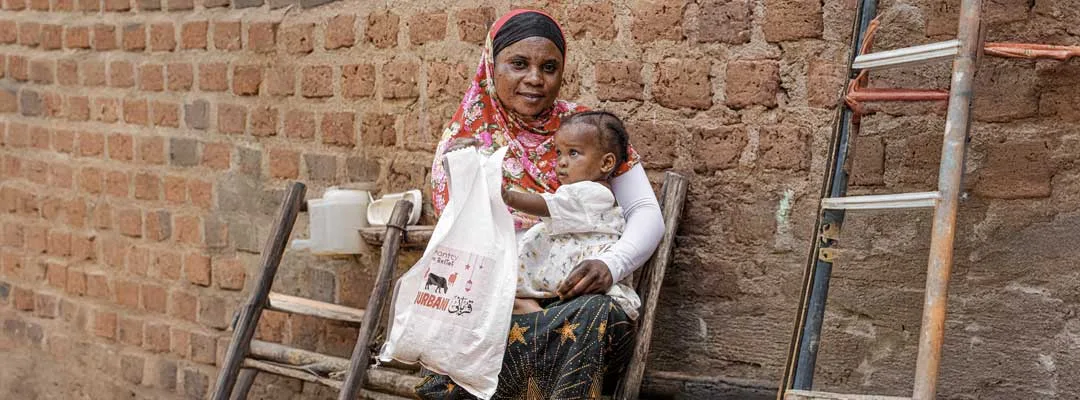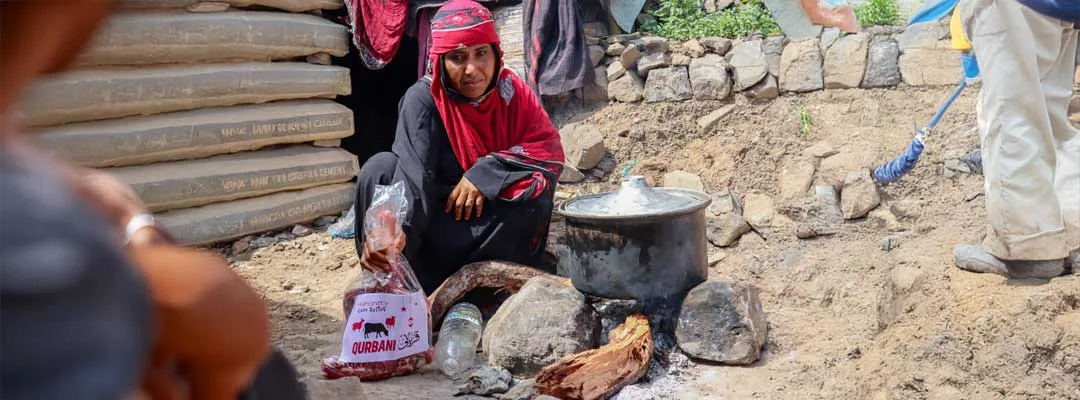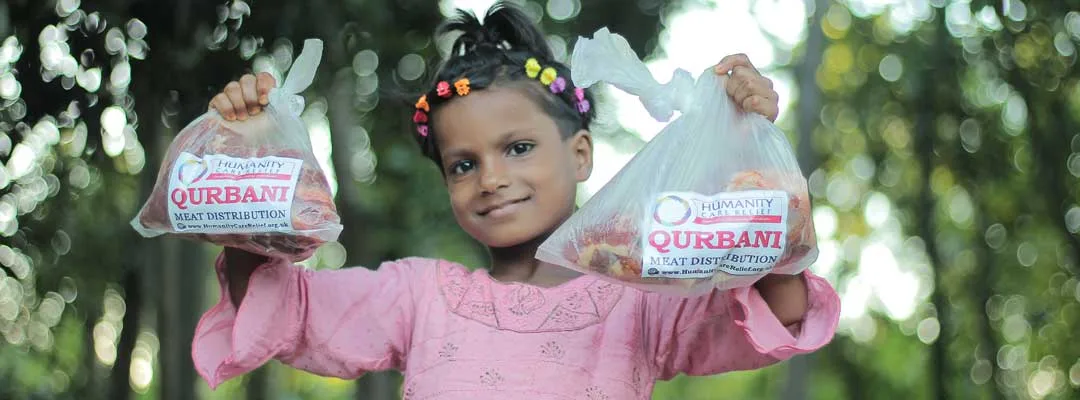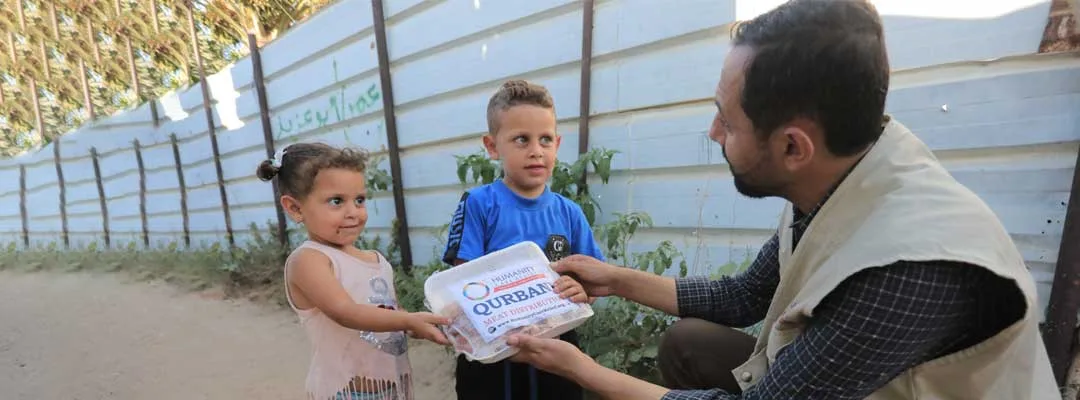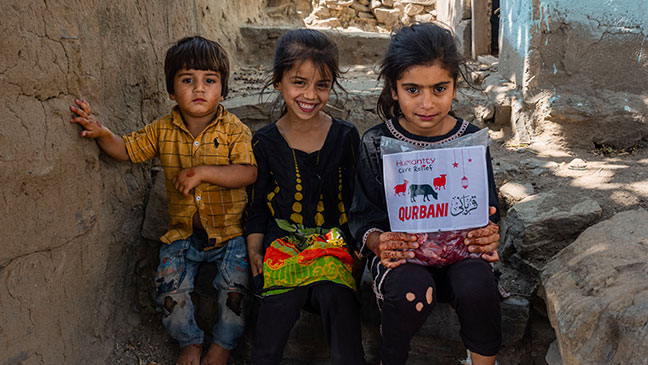Qurbani in Pakistan
In Pakistan, Qurbani is more than a sacrifice — it’s a chance to share joy with families who rarely taste meat. While many of us enjoy it freely, millions can’t afford it, not even once a year. Your Qurbani can change that.
- Over 40% of Pakistanis live below the poverty line.
- Nearly 1 in 3 children suffer from malnutrition, partly due to a lack of protein-rich food like meat.
For many families, Qurbani meat is the only time they eat properly in the entire year. No fridge, no savings — just hope. By donating your Qurbani with HCR, you’re putting fresh meat on their plates and Eid in their hearts.
Fulfil your obligation. Feed the forgotten. Give your Qurbani in Pakistan this Dhul Hijjah — where it’s needed most.
Image: Every year, Qurbani in Pakistan provides thousands of children and families with the chance to eat nutritious meals.
Qurbani in Africa
Across Africa, Qurbani brings more than meat — it brings dignity, relief, and the feeling of being remembered by the Ummah. In many Muslim communities, Eid comes and goes without a single bite of meat. Your Qurbani can change that.
- In Sub-Saharan Africa, over 60% of people live on less than £1.50 a day.
- In remote villages, families go months — even years — without meat.
When you give your Qurbani in Africa through HCR, you’re reaching some of the most neglected Muslim communities — places with no local butchers, no regular aid, and no access to fresh meat.
This is your chance to honour the Sunnah and feed those who would otherwise go without. Sacrifice with sincerity. Give your Qurbani where it brings the greatest relief.
Image: In remote African villages, your Qurbani brings joy, dignity, and the only meat some families will eat all year.
Qurbani in Yemen
Yemen holds a special place in the hearts of Muslims. The land of faith and wisdom — yet today, its people face hunger, war, and deep uncertainty. For many, Qurbani is their only chance to eat meat all year.
- Over 17 million Yemenis are food insecure, with families relying on bread, rice, and little else.
- Meat has become a luxury most can’t afford, even on Eid.
When you give your Qurbani in Yemen, you’re not just fulfilling a sacred duty — you’re sending relief to families who’ve lost everything. Orphans, widows, and displaced families will receive fresh meat, not just a token bag of aid.
This Eid, revive a Sunnah where it means the most. Let your Qurbani reach the people of Yemen — and let them know they are not forgotten.
Image: In war-torn Yemen, your Qurbani is more than meat — it’s a moment of mercy, warmth, and relief for starving children and grieving families.
Qurbani in Bangladesh
In Bangladesh, Qurbani is a moment of joy — but only for those who can afford it. For countless families living in poverty, Eid passes with empty plates and silent prayers. Your Qurbani can bring smiles, meat, and meaning.
- Nearly 25% of Bangladeshis live below the poverty line, struggling to meet even basic needs.
- For many rural families, meat is a rare luxury, eaten only during Eid — if at all.
By giving your Qurbani in Bangladesh, you’re delivering fresh, hygienically prepared meat directly to those in greatest need — widows, day labourers, flood-affected families, and the elderly.
Let your sacrifice bring comfort and nourishment to those who wait all year. This Dhul Hijjah, fulfil your Qurbani where it truly matters.
Image: In the flood-affected regions of Bangladesh, your Qurbani feeds families who’ve lost everything — and restores smiles on Eid.
Qurbani in Syria
Years of war have shattered homes, scattered families, and stolen stability — but not faith. In Syria, Eid still arrives. Children still hope. But for millions, Qurbani meat is a distant dream.
- Over 90% of Syrians live below the poverty line.
- Many families eat no meat for the entire year, not even on Eid.
Your Qurbani in Syria reaches the most vulnerable — displaced families, widows, and orphans living in tents and ruins. It’s not just meat. It’s nourishment. It’s dignity. It’s a reminder that the Ummah hasn’t forgotten them.
This Eid, let your sacrifice reach beyond borders. Honour the Sunnah, feed the forgotten, and bring warmth to a land that’s endured too much.
Image: Amid the rubble of Syria, your Qurbani delivers fresh meat, hope, and a reminder that the Ummah has not forgotten them.
Qurbani in Gaza
“Qurbani is Cancelled in Gaza.”
This year, there will be no Qurbani in Gaza.
No Eid celebrations. No animals to slaughter. No meat to share.
Because the people of Gaza are facing death, not Eid.
- Over 60,000 lives lost, tens of thousands injured, and entire families wiped out.
- Famine has begun, and the UN warns that starvation is spreading fast.
- With farmland destroyed and animals scarce, Qurbani is no longer possible.
Gaza is in ruins — its streets turned to rubble, its homes flattened, its markets gone. What remains are children crying for food, mothers boiling leaves to feed their families, and fathers who no longer know how to provide.
But while Qurbani cannot go ahead, you can still give.
Your donation to our Gaza Emergency Appeal will help provide urgent food, water, and financial aid to those who have lost everything.
Don’t turn away.
Give in the spirit of Qurbani — with sincerity, sacrifice, and hope.
Let your gift be a lifeline for a family trying to survive what’s left of Gaza.
Image: In besieged Gaza, your Qurbani reaches families under blockade — offering not just food, but love and solidarity on the day of Eid.
Why Your Qurbani Matters
Qurbani is one of the great rituals of Islam, in which we remember the Unity of Allah, His blessings upon us and the obedience of our Father Ibraaheem to his Lord, and in this act of Qurbani, there is much goodness and blessing. So Muslims must pay attention to its great importance.
The following is a brief look at this important ritual.
What is Qurbani?
Qurbani refers to the animal (camel, cattle or sheep) that is sacrificed as an act of worship to Allah, in the country in which the person offering the sacrifice lives, during the period from after the Eid prayer on the Day of Nahr (Eid al-Adha) until the last of the Days of Tashreeq (the 13th day of Dhu’l-Hijjah), with the intention of offering sacrifice. Allah says (interpretation of the meaning):
“Therefore turn in prayer to your Lord and sacrifice (to Him only).”
[al-Kawthar 108:2]
“Say (O Muhammad): ‘Verily, my prayer, my sacrifice, my living and my dying are for Allah, the Lord of the ‘Aalameen (mankind, jinns and all that exists).”
[al-An’aam 6:162]
“And for every nation We have appointed religious ceremonies, that they may mention the Name of Allah over the beast of cattle that He has given them for food. And your God is One God, so you must submit to Him Alone (in Islam)…”
[al-Hajj 22:34]
Image: Qurbani is more than sacrifice — it’s a gift of nourishment and unity for the Ummah.
Is Qurbani sunnah or obligatory?
Qurbani is a confirmed Sunnah according to the majority of scholars (some scholars say that it is waajib or obligatory; this will be discussed in more detail below).
The basic principle is that it is required at the appointed time from one who is alive on behalf of himself and the members of his household, and he may include in the reward for it whoever he wishes, living or dead. With regard to Qurbani on behalf of one who is dead, if the deceased bequeathed up to one-third of his wealth for that purpose, or included it in his waqf (endowment), then these wishes must be carried out, otherwise, if a person wishes to offer a sacrifice on behalf of someone who has died, this is a good deed and is considered to be giving charity on behalf of the dead.
But the Sunnah is for a man to include the members of his household, living and dead, in his Qurbani, and when he slaughters it, he should say, “Allahumma haadha ‘anni wa ‘an aali bayti (O Allah, this is on behalf of myself and the members of my household” – he does not have to make a separate sacrifice on behalf of every deceased person.
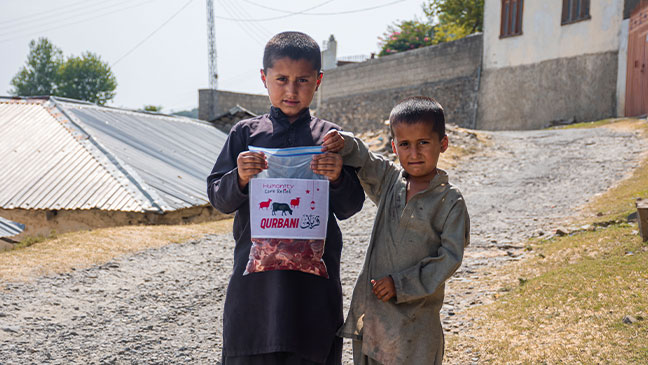
Udhiyah or giving its money in charity?
The scholars agreed that sacrificing the animal and giving its meat in charity is better than giving its value in charity, because the Messenger (peace and blessings of Allah be upon him) used to make the sacrifice, and he did not do anything but that which is best and most befitting. This is the opinion of Abu Haneefah, al-Shaafa’i and Ahmad.
Virtues of Qurbani and the Best of Qurbani
Ruling of Qurbani
Conditions of Qurbani
Things to Avoid in Dhul-Hijjah
Qurbani is not only a significant religious duty but also a means to demonstrate gratitude to Allah, share blessings with others, and purify one’s wealth and soul.


